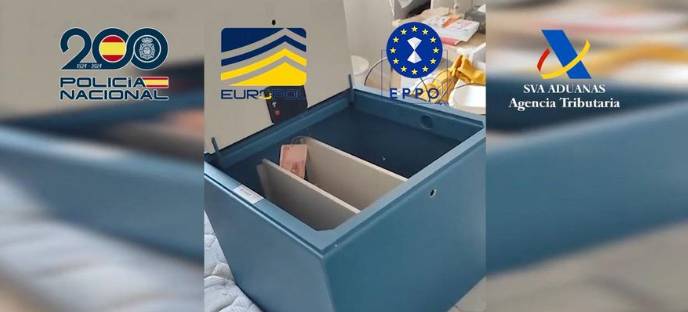In a joint operation led by the European Public Prosecutor’s Office and involving police forces from Greece, France, and Bulgaria, agents from the National Police, Customs Surveillance, and the National Tax Agency’s National Tax Office (ONIF) have dismantled a criminal organisation that was allegedly responsible for tax fraud in the import of goods from China. The organisation defrauded over €56 million in Spain and a total of over €700,000,000 in Europe. Six individuals have been apprehended in Spain, and ten searches have been conducted in various locations, including Elche. The seizures have resulted in the seizure of €475,000 in cash and €490,000 in cryptocurrencies. They posed as Spanish companies in order to disguise the fact that the organisation was responsible for paying the import taxes, rather than the companies.
The investigation stemmed from a 2023 complaint filed by an Almería-based company that, after receiving a notice from the AEAT (Tax Agency) claiming the allegedly defrauded VAT amounts, realised that its business identity had been stolen in connection with intra-community transactions in which it had not participated.
The dismantled organisation was engaged in the importation of goods, primarily textiles, from China without fulfilling its VAT obligations. They impersonated Spanish companies, which had no knowledge of these transactions, to pretend that these companies, and not the organisation, were responsible for the taxes payable on the imports. The vast majority of the products were ultimately sold in various Chinese bazaars.
100 Spanish Companies Stolen to Commit Fraud
The goods from China were acquired by Bulgarian companies, used as fronts, with mere front men as partners and directors. These companies simulated sales transactions to Spanish companies, unrelated to the fraud, in some cases well-known and unaware of these transactions.
In this regard, around 100 Spanish companies have been identified as victims of the theft of their tax identity. These companies are scattered throughout Spain.
Once the goods were cleared through Greek customs, they were transported to Italy and, from there, to various European countries, such as Spain. They thus became phantom goods and were difficult to trace. Finally, they were sold by the criminal organisation to Chinese bazaars located in various Spanish areas, particularly the Cobo Calleja industrial estate in Fuenlabrada and the PICA Yellow Road in Seville.
In fact, the criminal organisation handled large amounts of cash, which it received in payment for merchandise deliveries. The organisation’s branch in our country operated as a transport logistics company, sometimes using it to transport cash for trucks and transporters to go undetected.
Europe-wide operation in Spain and 13 other countries
The investigation carried out by the EPPO, codenamed “Calypso,” spans 14 countries: Bulgaria, China, the Czech Republic, Denmark, France, Germany, Greece, Hungary, Italy, Poland, Portugal, Slovakia, Slovenia, and Spain. A total of 101 searches were carried out at customs brokers’ offices, companies controlled by the organised criminal groups under investigation, the homes of suspects, and the offices of tax advisors and representatives, lawyers, accountants, and transport companies in Bulgaria, Greece, France, and Spain. Ten people were arrested, and firearms and knives were seized at the homes of three suspects.
€5.8 million was seized (€4.75 million in Greece and the remainder in France and Spain) in various currencies, including Hong Kong dollars, euros in digital wallets, and cryptocurrencies. A total of 7,133 electric bicycles and 3,696 electric scooters were also seized, in addition to 480 containers for inspection and verification at the Port of Piraeus.
The fraud began with the undervaluation of goods arriving in the EU
The fraudulent scheme began with the introduction of goods from China into the European Union, primarily through the port of Piraeus (Greece), with significant undervaluation or incorrect reclassification of the products to evade customs duties—using false documents to conceal the true value and nature of the goods. A network of professional facilitators operating at the customs entry point, such as customs brokers, service providers, and accounting firms, facilitated the initial clearance and the apparent purchase and transportation of the goods by companies primarily registered in Bulgaria but operating in Greece with a Greek VAT number.
The goods were subsequently sold to companies established in other Member States, allowing the first apparent buyer to benefit from an import VAT exemption based on Customs Procedure 42 (CP42). This procedure, created to simplify cross-border trade, exempts importers from paying VAT in the country of import if the imported goods are subsequently transported to another EU Member State.
Through a chain of interposed and front companies, the goods were ostensibly sold to companies in specific Member States, where they were supposedly sold to the market. These destinations included Bulgaria, the Czech Republic, Denmark, Germany, Hungary, Italy, Slovakia, Slovenia, and Spain. However, these fake end-buyers never received the goods and operated as hidden traders, without paying VAT. In some cases, criminal organisations used the identity documents of legitimate companies, fraudulently impersonating their VAT numbers to conceal the true destination of the goods.
Once the goods entered the EU, they were stored in warehouses and locations controlled by criminal organisations, from where they were transported, using false documents, to France, Italy, Poland, Portugal, and Spain (the real destination countries). These Chinese logistics centres, where all the goods were stored, operated as highly controlled warehouse districts, functioning almost like exclusive communities accessible only to members of the criminal groups that manage them.
The transport documents were destroyed as soon as the goods were delivered, and they were then sold to end customers, primarily on the black market, for cash, as part of a highly hidden parallel economy.
Comprehensive Criminal Enterprise
The criminal organisations under investigation were responsible for producing false invoices and shipping documents to conceal the true destination of the goods, and for recruiting a large network of front companies used for false sales and deliveries, thereby concealing the entire fraudulent chain. This allowed companies controlled by the criminal organisations to sell products at a very competitive price, since VAT is not paid, and customs duties and anti-dumping duties are largely evaded.
Finally, the proceeds of the crime were transferred to China using various money laundering techniques, including the provision of laundering services to other criminal organisations through underground trade-based banking systems. In this way, the organised criminal groups controlled and concealed the entire criminal chain, from the initial fraudulent importation to VAT fraud, and from the sale of the goods to the laundering of the proceeds.
Estimated fraud across the EU exceeds €700 million, of which more than €56 million corresponds to unpaid revenues from the Spanish Treasury.
In Spain, 10 raids and searches have been carried out in various cities—Madrid (5), Badajoz (1), Badalona (1), Elche (1), Manises (1), and Seville (1)—leading to the arrest of six people—Badajoz (4), Seville (1), and Madrid (1), in addition to five suspects who were not arrested. Numerous financial products, various real estate assets, and vehicles have been seized. The operation resulted in the seizure of €475,000 in cash and €490,000 in cryptocurrencies. Eleven properties, 27 vehicles, and luxury items (handbags, watches, and jewellery) have also been confiscated.









No Comment! Be the first one.